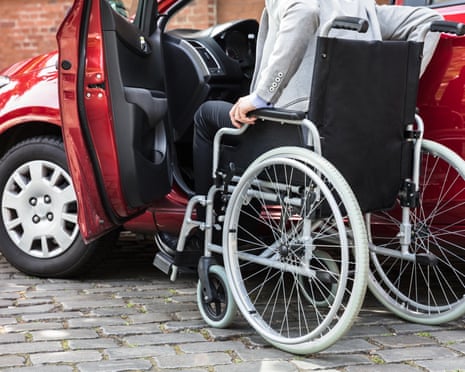
Motability scheme to drop BMW and Mercedes as it aims to buy UK-made cars
Rachel Reeves says changes to subsidised scheme for disabled drivers will help support thousands of jobs
The Motability scheme to provide disabled drivers with subsidised cars has said it will remove expensive cars such as BMW and Mercedes-Benz and aim to buy more British-built cars.
Motability said it hopes that 50% of the vehicles it offers will come from British factories by 2035. The chancellor, Rachel Reeves, said the changes to the scheme would “support thousands of well-paid, skilled jobs”, before the budget on Wednesday.
The Motability scheme has provided support for disabled drivers for decades to help with the extra costs caused by mobility issues. It buys cars from manufacturers and leases them to disabled drivers. Some are adapted to be accessible to wheelchairs.
The removal of the premium cars from the scheme comes despite the fact that those vehicles were available at no extra cost to the taxpayer, because disabled drivers paid more for them from their own pockets. Those premium brands only made up 40,000, or about 5%, of the 800,000 Motability cars.
Reeves has considered removing tax breaks for the scheme, under which disabled people are exempt from VAT and insurance premium tax. Disability Rights UK has previously said that charging VAT would add thousands of pounds to costs for disabled people, making travel harder.
Motability Operations, the company that runs the scheme, declined to comment on budget measures.
However, it said that premium-brand cars such as BMW and Mercedes will be “removed immediately” to “focus on vehicles that meet disabled people’s needs and represent value and purpose”.
The target of securing half of the cars from British factories could provide a significant boost to the UK car industry. The Japanese manufacturers Nissan and Toyota make cars in Sunderland, Tyne and Wear, and Burnaston, Derbyshire, respectively. Mini, owned by BMW, could also benefit, giving the company a strong incentive to build “paused” electric versions at a factory in Oxford.
Motability Operations said that the decision “opens the door to new investment into UK car manufacturing”.
The scheme currently leases about 300,000 vehicles a year. Assuming it remains about the same size, that would mean 150,000 British-built vehicles being leased in 2035 – up from 22,000 last year.
The prospect of more than 100,000 extra sales within the UK would be welcome for the British car industry after years of decline and factory closures. Production this year could slump below 700,000 cars, after a cyber-attack halted output from Jaguar Land Rover. None of the models currently made by Jaguar Land Rover would be eligible for the scheme.
after newsletter promotion
Andrew Miller, the Motability Operations chief executive, said: “Working with government and the automotive sector, we want to do even more to support the economy and our ambitious commitment should put British car manufacturing into top gear.”
Nissan will be one of the earliest beneficiaries, with the number of UK-built vehicles bought by Motability doubling.
James Taylor, the managing director of Nissan GB, said: “Nissan welcomes Motability’s commitment to buy British-built cars and its support for UK manufacturing. As a longstanding partner, we recognise the crucial role the Motability scheme plays in helping disabled people remain mobile and independent. We look forward to working with Motability to deliver its ambitious goals.”